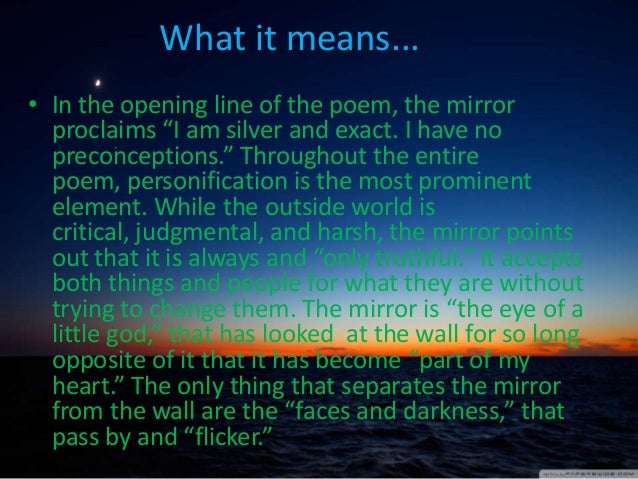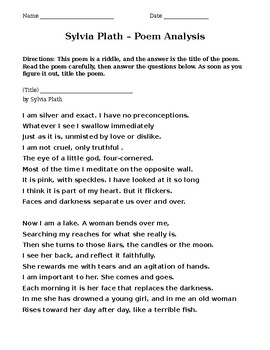
The Mirror was written by Sylvia Plath in 1961 but wasnt published until 1971 eight years after her death by suicide. Sylvia Plaths Mirror offers a unique perspective on the attitudes of aging.

The free-verse poem tells the story of a woman who continuously looks at her reflection first in a mirror and then in a lake.
Mirror by sylvia plath theme. Sylvia Plaths Mirror is a poem which deals intimately with the idea of women searching for distinctions between the real self and the false. It uses the titular mirror as its central symbolic device. Many of Plaths poems deal with the complexities of defining womanhood and existing in a female space.
Mirror confronts this issue directly. I believe that the central theme of this poem is about senescence. The beauty of this poem is that Plath uses personification through the mirror as a reflection of ones age.
Thus the self in Plaths poem is a vanishing truth according to the mirrors reflection Plaths Mirror narrates a lifetime of interactions with a nameless faceless woman and imagines aging as disfigurement Hunter. Thus the theme of truth is once again supported from a critics viewpoint. In conclusion Plaths poem delves into the feminine psyche using elements of the dual nature of the mirror in relation to the.
Mirror by Sylvia Plath Introduction. Mirror is a free verse written by the American poet Sylvia Plath. The poem is written from the.
The theme of the poem is that of truth and its effects. It explores how sometimes truth can cause agony. The poem is a free.
Mirror by Sylvia Plath. The Mirror by Sylvia Plath is an unforgettable poem told from the perspective of a mirror. The mirror gives an autobiographical account of itself.
This poem claims that though certain images reflected in it might be painful to certain people at certain stages of their lives it is in no way responsible for causing this. Plath uses the theme of time within Mirror to investigate how everyone wastes time in some form. She explores the idea of regret throughout time pondering how she once spent her youth worrying about her aesthetic beauty and how she looked to others for validation.
She looks in the mirror to search its reaches for what she really is. The use of this metaphor distinctively displays how Plath. Sylvia Plath wrote Mirror on 23 October 1961.
At the time she was writing a poem a day. A product of a creative writing class led by Robert Lowell who helped her to develop her personal and confessional style at Boston in the late 1950s Plath would overcome writers blockcolygraphia by sitting down and writing a poem on a different theme or subject if she had nothing more. A poem written from the point of view of a mirror is practically required to be to some extent about appearances.
This mirror tells us repeatedly about how accurate and unbiased it is in showing. In Sylvia Plaths poem Mirror the theme is one of insecurity and self-inspection. Since a mirror offers an honest reflection of what stands before it a woman is forced to come to terms with the reality of her physical and emotional being.
In the Poem Mirror by Sylvia Plath there is a continuing theme of change. In the beginning the changes are simple like the acts of day turning to night but at the end we see the life changes of a woman in particular. The Mirror was written by Sylvia Plath in 1961 but wasnt published until 1971 eight years after her death by suicide.
The free-verse poem tells the story of a woman who continuously looks at her reflection first in a mirror and then in a lake. The poem is written from the mirrors perspective and details what it sees and how it relates to the woman and other objects within its view. The central purpose of Plaths poem Mirror is to explain how people can look at themselves and not really see the whole picture about their.
Sylvia Plaths Mirror explores the impact of time on individuals specifically within the realities of aging and losing beauty. Here Plath speaks from an implied autobiographical perspective. As readers we know that much of Plaths oeuvre of poetry focuses on her lost youth and.
Sylvia Plaths Mirror offers a unique perspective on the attitudes of aging. Mirror displays tremendous insight and objectivity into the natural human behavior of growing older. Plath is able to emphasize the loneliness hope despair and insecurity that awaits us through.
Mirror 1 st Stanza I am silver and exact. I have no preconceptions. What ever you see I swallow immediately Just as it is unmisted by love or dislike.
I am not cruel only truthful— The eye of a little god four-cornered. Most of the time I meditate on the opposite wall. It is pink with speckles.
I have looked at it so long I think it is a part of my heart. Faces and darkness separate us. Sylvia Plaths Mirror - YouTube.
If playback doesnt begin shortly try restarting your device.